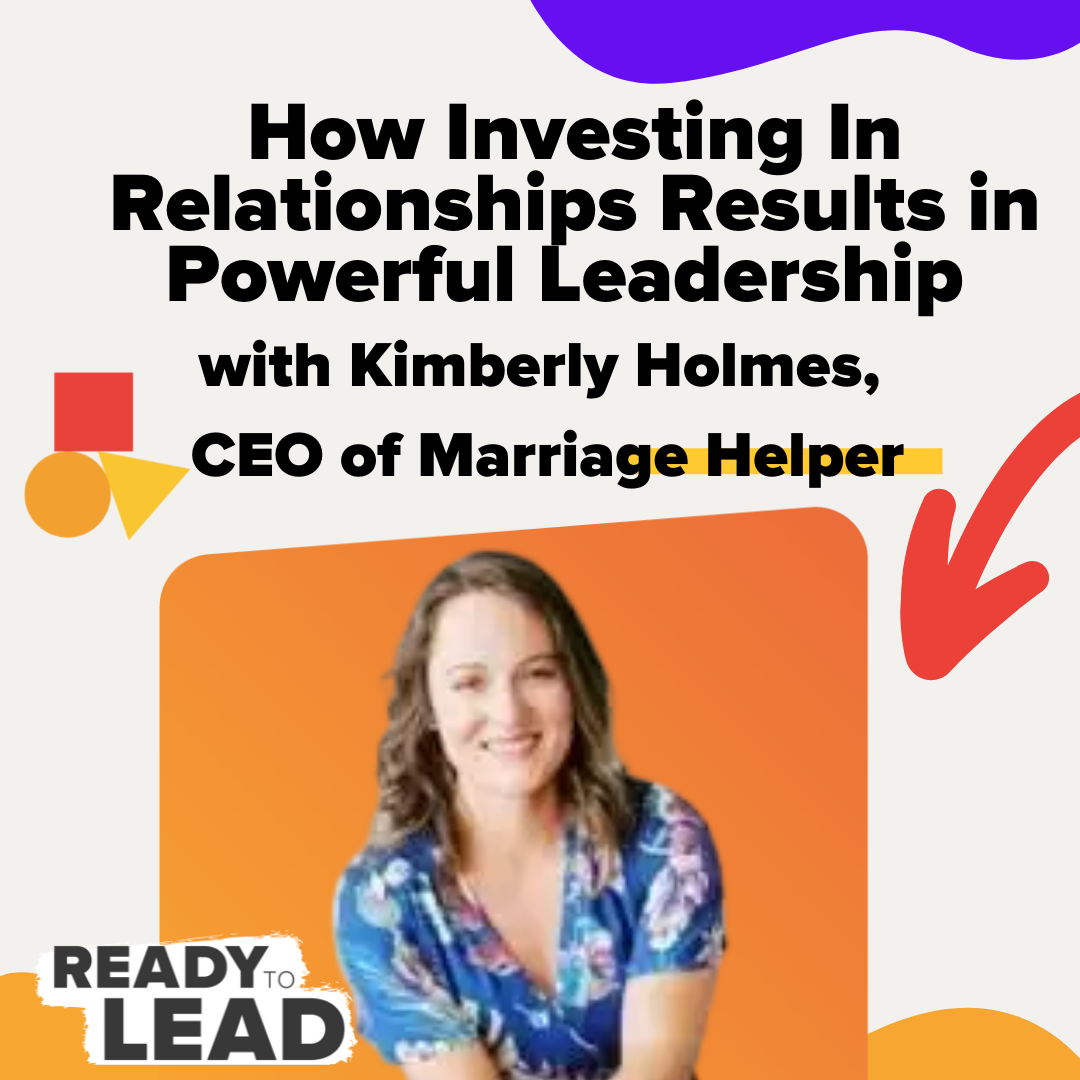When you invest in appropriate relationships with the people you lead and make them feel valuable, you become all the more effective as a leader.
In today’s episode, host Jeff Mask sits down with Kimberly Holmes, CEO of Marriage Helper to talk about some universal principles that work across all relationships, whether personal or professional. Kimberly is passionate about championing marriages and creating strong families. She and her team want to take over the world with hope for great relationships.
Listen in as she shares how you can implement these powerful relationship principles into your leadership.
How Kimberly Became CEO of a Successful Company
Kimberly’s story starts back in the mid-1980s. The founder of Marriage Helper was a very successful speaker whose schedule was booked five years out. He was married with two daughters when he fell in love with another woman, and left his family to be with her. He was divorced for three years, became a drug addict and an alcoholic, lost his friends, was living out of his car, and almost died. He told God he was going to turn his life around, called his ex-wife, and asked her to take him back, which she did, against the advice of her loved ones.
They remarried, even though they weren’t in love, and they had a third child in celebration of their remarriage. That child was Kimberly. She says, “I literally would not be on this earth if it weren’t for two people committed to trying to make it work, to put it back together.”
She entered the family business part-time and saw the amazing change that was happening in the 3-day workshops her parents hosted. The service worked, but they had no marketing whatsoever. Her dad was considering shutting it down, because it wasn’t profitable. She knew they had to get the message in front of people, because it was needed. They were an organization driven by mission and believed the stakes were high.
Kimberly became CEO with a staff of four. They started an email list, and experienced 100% growth for two consecutive years. There was really nowhere to go but up. In 6 years she had 5x’ed the company. She learned marketing, got clear on her why, and worked hard to scale. And now they have a staff of 75.
How to Invest In Relationships
You have to invest in people if you’re going to take your business from 4 people to 75. Kimberly has invested in relationships on her team, and the team helps people invest in their marriage relationships. What are some things she has learned about relationships over the years that can apply to us as leaders?
Kimberly says people want to leave a relationship for one of three reasons:
- They don’t feel liked.
- They don’t feel loved.
- They don’t feel respected.
At the core, if someone feels liked, loved, and respected, they’ll feel more attachment to the relationship they’re in. So, ask yourself: what am I doing that is showing the other person that I like, love, and respect them? People are attracted to those who evoke emotions that they enjoy feeling. Am I helping people feel edified, uplifted, supported, liked?
If leaders can do this in an appropriate way in their relationships at work, it makes all the difference. It changes us and the people we’re leading. People need to feel valued, like they’re not just a number. You want them to like the way it feels to be a part of your team and a part of your company.
The Four Stages of a Relationship
There are four stages to any relationship, and understanding each one of them can help you make your relationships stronger, whether at home or at work.
Stage 1: Attraction
Attraction isn’t just physical. There are four components to attraction: physical, intellectual, emotional, spiritual. (PIES, to help you remember) As a leader, how are you providing intellectual stimulation? How do you make people feel emotionally? And spiritually, we’re attracted to people who are aligned with our core values. Attraction is what makes us want to get closer to a person. When team members are attracted to our organization, they want to get closer, stay longer.
Stage 2: Acceptance
Once I’m attracted and move closer, as I learn more about them, can I accept this person for who they are without trying to change them? In business, sometimes people do need to change. They need to be coached into who they can be. But how do we approach this? I see your giftedness and potential, and what you can grow into. I accept who you are now, but I’m also not going to leave you here, because I see what you can be.
Stage 3: Attachment
The bottom line of attachment is I will be there for you, no matter what. That’s powerful. Sometimes it’s just sitting there, just listening. The way you build attachment and show someone you’ll be there for them is done in the small things consistently over time when the person needs you. You show up the way you say you’re going to show up.
Stage 4: Aspiration
You have a vision for your relationship, something you can look forward to together. When we can give the people on our team a vision of where they can go, the conflicts and drama at work don’t seem as big, because we remember our vision and our mission.
Leading As a Woman in a Male-Dominated World
As Jeff listens to Kimberly speak, he hears clarity, confidence, and conviction. He hears her knowing how to lead from her place of strength, leading as a female CEO powerfully and consistently. “How do you lead from a place of power and confidence in a very male-dominated world?” he asks her.
“I’m going to be completely vulnerable and open,” Kimberly says. “It probably hasn’t been until the past 2-3 years that I’ve trusted my voice. As a child, someone did and said things to me they shouldn’t have, and when I spoke up about it, nobody believed me. It wasn’t until I went to therapy and EMDR and faced my demons that I realized I wasn’t wrong. I was right. What happened to me was wrong. I can trust myself. I have discernment. I’m learning to know when to trust myself and when to get support from the people around me who believe in me.”
She goes on to say, “I’ve never seen men as the enemy, but I also want to empower women to trust themselves. We actually have innate parts of us that come naturally to some of us that can make us exceptional in our own way. I don’t see it as competition but as a collaboration.”
Jeff leaves us with some wisdom: The sooner we can be clear and calm with our past, the more powerfully we can lead in our present and future. We put those stories in our minds that tell us why we can’t do certain things, and they’re just not true. We have to find our voice, find our core values, and humbly and authentically lead from our strengths.
Richard and Jeff want to hear from YOU. Was something in today’s episode a big aha moment for you? Anything you disagreed with? What did you learn that you’ve applied to your leadership? Email them here with your thoughts/questions: feedback@readytolead.com
RESOURCES:
OTHER SHOWS YOU MIGHT ENJOY:
- Business Lunch with Roland Frasier and Ryan Deiss
- Perpetual Traffic with Ralph Burns and Kasim Aslam
- DigitalMarketer Podcast with Mark de Grasse


